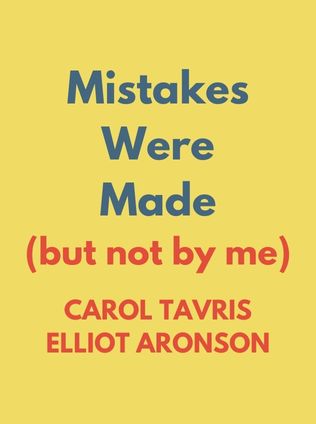
Mistakes Were Made (But Not by Me)
By Carol Tavris and Elliot Aronson
Published 07/2010
About the Author
Carol Tavris and Elliot Aronson are distinguished social psychologists who have made significant contributions to the understanding of human behavior. Tavris is known for her extensive work in debunking psychological myths and exploring how emotions like anger and guilt affect us. Her books, such as "Anger: The Misunderstood Emotion" and "The Mismeasure of Woman," showcase her ability to challenge societal norms and provoke critical thinking.
Aronson, on the other hand, is a pioneer in the field of social psychology, known for his groundbreaking work on cognitive dissonance, a theory originally developed by Leon Festinger. Aronson has expanded this theory in his numerous publications, including the widely acclaimed "The Social Animal," which provides a comprehensive overview of social psychological theories and their applications. Together, Tavris and Aronson bring a wealth of knowledge and insight into the complexities of the human mind, particularly how we justify our actions and maintain our self-concept even in the face of contradictory evidence.
Main Idea
The central premise of "Mistakes Were Made (But Not by Me)" revolves around the concept of cognitive dissonance and how it influences human behavior. Cognitive dissonance occurs when there is a conflict between our beliefs, attitudes, or behaviors, leading to psychological discomfort. To alleviate this discomfort, we often resort to self-justification—an unconscious process that allows us to rationalize our actions, even when they contradict our values or sense of self.
Tavris and Aronson delve into the various ways in which self-justification manifests, from small everyday decisions to major life choices that define our identities. They explore how confirmation bias, memory distortion, and self-deception work together to reinforce our beliefs and protect our self-esteem, even at the cost of truth and rationality. The book also examines the societal implications of these psychological processes, highlighting how they contribute to conflicts, misunderstandings, and the perpetuation of stereotypes and prejudices.
Table of Contents
- Introduction
- The Engine of Self-Justification
- Memory: The Self-Justifying Historian
- Good Intentions, Bad Science: The Closed Loop of Clinical Judgment
- Law and Disorder: The Justice System's Tunnel Vision
- Love's Assassin: How Self-Justification Wrecks Marriages
- The Politics of Self-Justification
- Letting Go and Owning Up
The Engine of Self-Justification
The book opens by explaining the foundational concept of self-justification—the engine that drives much of human behavior, often without our conscious awareness. Self-justification is the mental mechanism that allows us to maintain our self-esteem and a consistent sense of identity, even when faced with evidence that we have made mistakes or acted in ways that contradict our values. This process is so ingrained in our psyche that we often don't recognize it happening.
For example, imagine you made a costly financial decision that turned out poorly. Instead of admitting that the decision was flawed, you might justify it by focusing on the information you had at the time or by blaming external factors. This allows you to avoid the uncomfortable feeling of cognitive dissonance, the psychological discomfort that arises from holding two conflicting thoughts, such as "I am a competent person" and "I made a poor decision."
The authors highlight how self-justification can lead to a "slippery slope" of increasingly irrational and harmful behaviors. Once we start justifying one mistake, it becomes easier to justify further mistakes, often leading to a distorted view of reality. This concept is eloquently captured in the book:
Sign up for FREE and get access to 1,400+ books summaries.
You May Also Like
The Subtle Art of Not Giving a F*ck
A Counterintuitive Approach to Living a Good Life
By Mark MansonRich Dad Poor Dad
What the Rich Teach Their Kids About Money - That the Poor and Middle Class Do Not!
By Robert T. KiyosakiHow To Win Friends and Influence People
The All-Time Classic Manual Of People Skills
By Dale CarnegieFreakonomics
A Rogue Economist Explores the Hidden Side of Everything
By Steven D. Levitt and Stephen J. Dubner



















